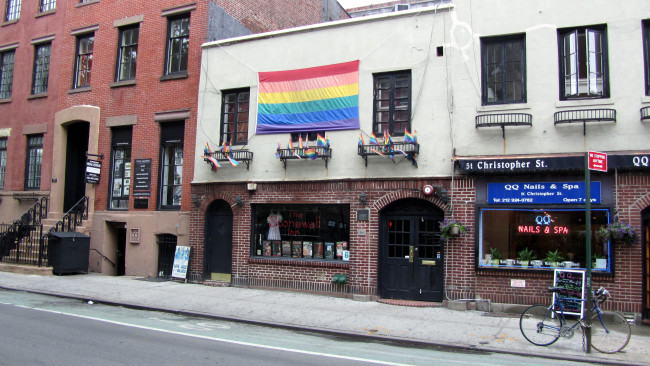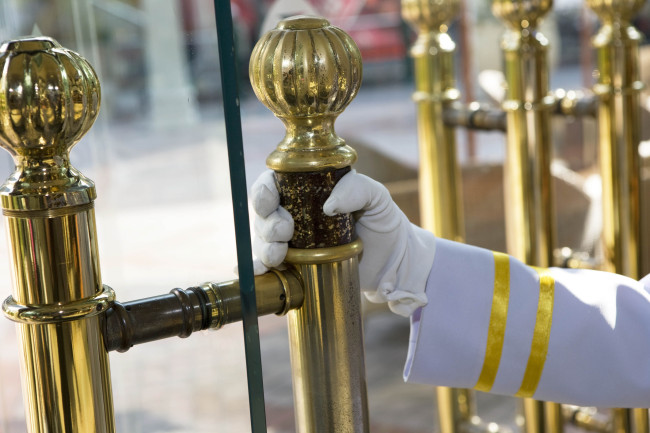After years of sharing a wall, saying goodbye to my Upper West Side neighbor
This is one of our favorite pieces by S.Jhoanna Robledo, Brick Underground's editor-in-chief , who passed away in July, three months after publishing this essay. The piece's precise observations, its empathy, and insights into what it means to be a New Yorker--and a neighbor--offer a glimpse into what Jhoanna was like as an editor, writer, and human being.
We said goodbye to S. last month at a stone church on a side street on the Upper West Side. Actually, we said goodbye to her back in January, when Alison from upstairs called me late one night to tell me that my next-door neighbor had passed away while we were out one day, I’m not sure now for what, perhaps a run to the grocery store or a visit with out-of-towners. What I do remember is the call itself: I was sitting on my couch in my living room with the not-enough light and the too-small rug, my back to the wall that my family’s apartment shared with S's. Our front doors stand side by side, less than a foot away. To say she was the closest thing to me in my building, literally, would not be an exaggeration.
[*This story first posted in April 2017.]
But like most New Yorkers living vertically, I didn’t know my neighbor well, not in the check-in-everyday-and-share-our-keys kind of way that some others in this city do. I do not know her birthday, her favorite restaurant, her favorite TV show. At the reception after her memorial last month, I was surprised to hear that she was a master quilter, with creations lovingly pieced together that would rival any other major enthusiast's. Until she’d passed away, I had never met her niece, who has the same eyes. It made me a little sad, how little I knew of the person who’d lived next door to me for more than six years. (Compared to her, I am a newbie to the building. She’d moved in decades before; we’ve only been here a little over a dozen years, and lived a chunk of that in other, smaller apartments, moving up to bigger ones until we were sharing the same floor.) In a weird way, I felt like I'd let her down, not getting to know her more, not asking more questions, but she was also fairly private and I never wanted to pry.
Here’s what I do know: She worked in radio for years and was a pioneer of sorts, being one of only a handful of female executives at her office in the 1980s. She loved WWD magazine and other fashion publications; her subscriptions showed up regularly at her doorstep, hand-delivered. (Weeks after S.'s death, I opened my door to see one in the middle of our landing right by the elevator—her subscription hadn't been cancelled yet—and my heart ached a little, seeing it just lie there; I grabbed it and propped it by her front door, even though I knew she wasn't there to read it.) I know that she was glued to the news all election night and afterward, and she was just as surprised—no, shocked—by the results as most everyone else in this country. Statuesque and regal, she wore her silvery hair mostly in a ponytail, and sometimes donned a white baseball cap. Sometimes, I’d walk the dog she’d inherited from her roommate, who sadly passed away 15 months before and whom we all missed. S. and I would talk about her sometimes, how the grief ebbs and flows but mostly flows, how it hits you at the unlikeliest times. And she delighted in Alison’s young son, who loved walking the dog, too, and who’d ring her doorbell, eager and ready to help. And when the new elevator went on the fritz just months after it was installed with much ceremony, S. and I shared some frustrated laughs.
Mostly, we shared the moments that come and go and we take for granted with our neighbors, the knowing glances when something in the building happens that makes you shake your head—a porter is suddenly dismissed without explanation; new laundry machines are installed that charge higher prices. And the nods of hellos and how-are-you-doings in the hallways. Once, she jokingly sassed my older son on my behalf when he was churlish (which, thankfully, doesn’t happen very often, and he took it in stride); a few times, she offered the occasional encouragement when I might have looked defeated. Often, I was just thankful to see a friendly, familiar face after battling it out there in the world of grown-ups and before I opened my own door to my husband and my kids, whom I adore but need to be a grown-up to.
I will miss seeing her. I will miss hearing her dog next door. And though I might not have known her for very long, or for very much, she, like some of my other neighbors, have helped make this building we all live in feel like home. In a city like New York where anonymity can be had at any moment, but where so many of us jostle to find our place in a competitive firmament and try to make ourselves known, a happy medium found in the hallways and laundry rooms and elevators of our buildings, and right outside our apartment doors, where a friendly neighbor can make you feel seen and heard, even if they may not know everything about you, is a treasure. In an instant, the city feels more familiar, personal, manageable.
Goodbye, S. The elevator hasn't broken down in a long time, thank goodness, and no one new has moved into your old apartment. I'm sorry I didn't check in with you more often, never got around to inviting you over for dinner because I was so worried I'd be intruding. Next time, with the next neighbor, I'll make an effort not to let my self-consciousness get the better of me.
I hope you get WWD magazine deliveries wherever you are. The newest issue has a story on high-end watches on the cover, and apparently, Google's getting into the timepiece game.
And one more thing: Thank you for being my neighbor.
You Might Also Like




























